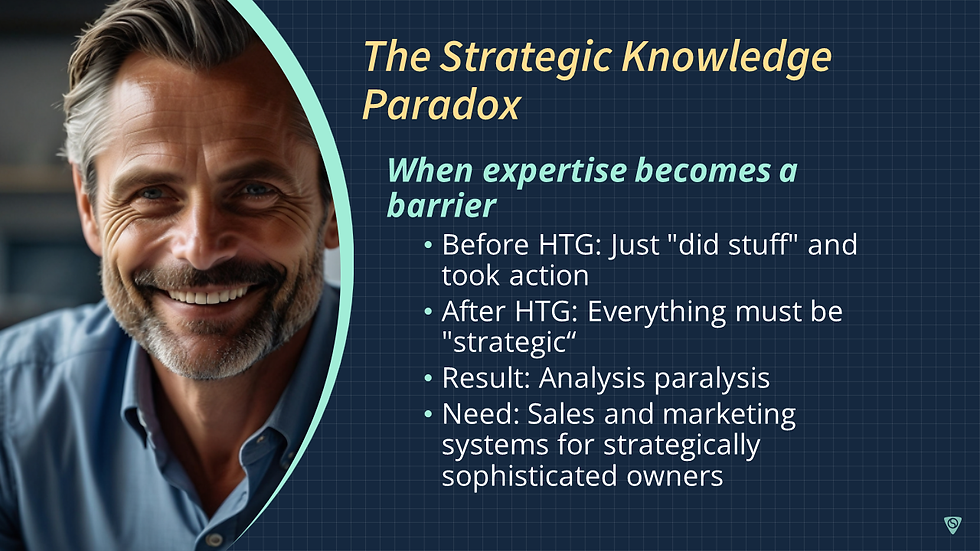The Strategic Knowledge Paradox: When HTG Expertise Becomes a Barrier
- Simon Hale

- Aug 18, 2025
- 4 min read

Why sometimes knowing more makes implementing harder
Here's a paradox that might surprise you.
The strategic knowledge you gained from Help to Grow—that sophisticated understanding of customer segmentation, competitive positioning, and marketing frameworks—might actually be making sales and marketing implementation harder, not easier.
I know how that sounds. You invested time and effort in developing strategic expertise. You can analyse markets, understand customer journeys, and develop positioning strategies that most business owners never master. That knowledge is genuinely valuable.
But here's what I've noticed working with HTG graduates: sometimes strategic sophistication creates implementation paralysis.
The Before and After Reality
Before HTG: You probably just "did stuff" to grow your business. You tried networking events, created some basic marketing materials, maybe started posting on LinkedIn occasionally. Some approaches worked, others didn't, but you took action. You experimented, learned from results, and adjusted your approach.
It wasn't always strategic, but it was action-oriented.
After HTG: Now you know about customer journey mapping, value proposition canvases, competitive analysis frameworks, and strategic positioning models. You understand the difference between marketing strategy and tactics. You can segment customers using multiple criteria and develop messaging that speaks to specific pain points.
Everything feels like it should be done "strategically" and "properly."
How Expertise Creates Paralysis
The paradox works like this: the more you know about best practices, the more pressure you feel to implement perfectly.
Before HTG: "I'll try posting about client problems on LinkedIn and see what happens."
After HTG: "I should develop a comprehensive content strategy that aligns with my customer segmentation, reflects my value proposition positioning, and supports my broader marketing funnel before I post anything."
The first approach leads to action (imperfect but real). The second leads to analysis paralysis disguised as strategic thinking.
The Perfectionism Problem
HTG teaches you frameworks and best practices because they work. But knowing what "good" looks like can make you reluctant to do anything that's merely "adequate."
This shows up in several ways:
Content Creation Paralysis "I know what good thought leadership looks like now, so I can't just post random thoughts. Everything needs to demonstrate strategic insight and provide real value to my target audience."
Networking Hesitation "I understand customer segmentation, so I shouldn't waste time at general networking events. I need to find events where my ideal customers actually attend."
Lead Generation Procrastination "I know the principles of effective lead magnets, so I can't just create a basic PDF. It needs to be genuinely valuable, well-designed, and clearly aligned with my customer journey mapping."
All of these thoughts are strategically sound. But they can prevent you from taking any action at all.
The Implementation vs Optimisation Confusion
Here's a crucial distinction that HTG doesn't explicitly teach: there's a difference between implementation and optimisation.
Implementation is about getting systems working, even if they're not perfect. It's about taking action that creates results, learns from feedback, and builds momentum.
Optimisation is about refining systems that are already working. It's about applying strategic frameworks to improve existing activities.
The problem? Many HTG graduates try to optimise before they implement. They want to create perfect systems from the start rather than good-enough systems that can be improved over time.
What Strategic Sophistication Should Actually Enable
Your HTG knowledge isn't the problem—it's incredibly valuable. The issue is how you're applying it.
Strategic sophistication should make you more effective at implementation, not more reluctant to start.
Here's how successful HTG graduates use their strategic knowledge:
For Better Decision Making They use customer segmentation to focus their limited time on the most promising opportunities, not to justify avoiding action until they have perfect clarity.
For Smarter Testing They design small experiments informed by strategic thinking, rather than waiting to implement comprehensive strategic plans.
For Faster Learning They use frameworks to interpret results and adjust quickly, rather than as reasons to plan longer before starting.
For Efficient Resource Allocation They apply strategic thinking to focus effort where it will have the biggest impact, given their actual constraints.
Breaking the Paradox
If you recognise yourself in this strategic knowledge paradox, here's how to break free:
Separate Planning from Implementation Use your strategic knowledge for planning, but don't let it paralyse implementation. Plan strategically, then implement pragmatically.
Embrace "Good Enough" to Get Started Your first attempt doesn't need to be perfect. It needs to be good enough to test assumptions and learn from real market feedback.
Apply the 80/20 Rule Your strategic approach probably needs to be about 80% right to start generating results. You can optimise the remaining 20% based on real experience.
Remember Your Pre-HTG Action Bias You took action before you had strategic frameworks. That action-taking ability is still there—now you just need to combine it with your new knowledge.
The Sweet Spot
The goal isn't to ignore your strategic knowledge—it's to apply it in service of action rather than as a barrier to action.
Strategic knowledge + practical implementation systems = sustainable business growth.
Strategic knowledge - action = expensive education with no business impact.
Your Next Step
Your strategic sophistication is an asset, not a liability. But only if you use it to take better action, not to justify taking no action.
The question isn't whether your approach will be strategically perfect. The question is: what's one sales or marketing activity you could start this week that's informed by your strategic knowledge but doesn't require perfect execution?
That's where strategic knowledge becomes business value.
Ready to turn strategic knowledge into practical action? Get your free 90-Day HTG Sales & Marketing Implementation Starter Guide.
Comments